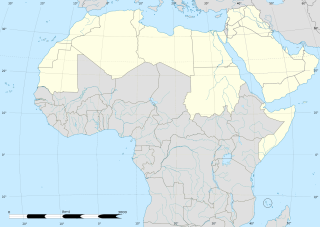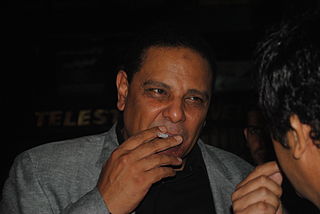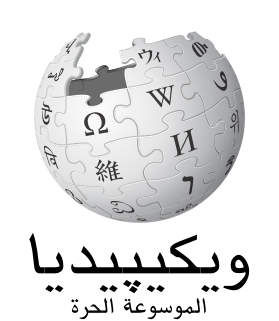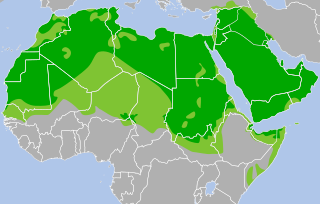Related Research Articles

Arabic is a Semitic language that first emerged in the 1st to 4th centuries CE. It is now the lingua franca of the Arab world. It is named after the Arabs, a term initially used to describe peoples living in the area bounded by Mesopotamia in the east and the Anti-Lebanon mountains in the west, in Northwestern Arabia and in the Sinai Peninsula. The ISO assigns language codes to thirty varieties of Arabic, including its standard form, Modern Standard Arabic, also referred to as Literary Arabic, which is modernized Classical Arabic. This distinction exists primarily among Western linguists; Arabic speakers themselves generally do not distinguish between Modern Standard Arabic and Classical Arabic, but rather refer to both as al-ʿarabiyyatu l-fuṣḥā or simply al-fuṣḥā (اَلْفُصْحَىٰ).

Coptic or Coptic Egyptian is the latest stage of the Egyptian language, a northern Afro-Asiatic language that was developed during the Greco-Roman period of Egyptian history, and was spoken until at least the 17th century. In the 2nd century BC, Egyptian began to be written in the Coptic alphabet, which is an adaptation of the Greek alphabet with the addition of six or seven signs from Demotic Egyptian to represent Afro-Asiatic sounds that the Greek language did not have.

The Arab world, formally the Arab homeland, also known as the Arab nation, the Arabsphere, or the Arab states, consists of the 22 Arab countries which are members of the Arab League. A majority of these countries are located in Western Asia, North Africa, and the Horn of Africa; the southernmost member, the Comoros, is an island country off the coast of East Africa. The region stretches from the Atlantic Ocean in the west to the Arabian Sea in the east, and from the Mediterranean Sea in the north to the Indian Ocean in the southeast. The eastern part of the Arab world is known as the Mashriq, and the western part as the Maghreb. Arabic is used as the lingua franca throughout the Arab world.

Umm Kulthum was an Egyptian singer, songwriter, and film actress active from the 1920s to the 1970s. She was given the honorific title Kawkab al-Sharq.

Raqs sharqi is the classical Egyptian style of belly dance that developed during the first half of the 20th century.
Al-Maqrīzī or Makrīzī, he was Taqī al-Dīn Abū al-'Abbās Aḥmad ibn 'Alī ibn 'Abd al-Qādir ibn Muḥammad al-Maqrīzī (1364–1442) was a prominent medieval Egyptian Arab historian during the Mamluk-era, remarkable in this context for his unusually keen interest in the Fatimid dynasty and its role in Egyptian history."

Egyptian Arabic, locally known as Colloquial Egyptian, or simply Masri (مَصرى), is the spoken vernacular Arabic dialect of Egypt.

Modern Standard Arabic (MSA), or Modern Written Arabic, is a term used mostly by Western linguists to refer to the variety of standardized, literary Arabic that developed in the Arab world in the late 19th and early 20th centuries. It is the language used in academia, print and mass media, law and legislation, though it is generally not spoken as a mother tongue, like Classical Latin or Soutenu French. MSA is a pluricentric standard language taught throughout the Arab world in formal education. It differs significantly from many vernacular varieties of Arabic that are commonly spoken as mother tongues in the area; these are only partially mutually intelligible with both MSA and with each other depending on their proximity in the Arabic dialect continuum.

The Egyptian Football Association (Arabic: الإتحاد المصري لكرة القدم is the governing body of football in Egypt. A member of FIFA since 1923 and a founding member of CAF, the EFA has jurisdiction for the Egyptian football league system and is in charge of the men's and women's national teams. The EFA headquarters is located in Gezira, Cairo. The EFA organizes the professional Egyptian Premier League, the semi-professional Egyptian Second Division alongside the lower regional leagues in the third and fourth level of the league system.
The romanization of Arabic refers to the standard norms for rendering written and spoken Arabic in the Latin script in one of various systematic ways. Romanized Arabic is used for a number of different purposes, among them transcription of names and titles, cataloging Arabic language works, language education when used moreover or alongside the Arabic script, and representation of the language in scientific publications by linguists. These formal systems, which often make use of diacritics and non-standard Latin characters and are used in academic settings or for the benefit of non-speakers, contrast with informal means of written communication used by speakers such as the Latin-based Arabic chat alphabet.

Fellah is a farmer or agricultural laborer in the Middle East and North Africa. The word derives from the Arabic word for "ploughman" or "tiller".

Alaa Al-Aswany is an Egyptian writer, and a founding member of the political movement Kefaya.

Egyptians speak a continuum of dialects. The predominant dialect in Egypt is Egyptian Colloquial Arabic or Masri/Masry, which is the vernacular language. Literary Arabic is the official language and the most widely written; additionally, it is the liturgical language of Islam, the majority religion and state religion of Egypt. The Coptic language is used primarily by Egyptian Copts and it is the liturgical language of Coptic Christianity.

Egyptian passports are issued to nationals of Egypt for the purpose of international travel. Besides serving as a proof of Egyptian citizenship, they facilitate the process of securing assistance from Egyptian consular officials abroad if needed. Egyptian passports are valid for seven years for adults, and is issued for lesser periods for school or college students, or those who have not finalized their status of the military conscription. Starting in 2008, The Egyptian government introduced newer machine-readable passport (MRP), in order to comply with international passport standards and requirements with 96.7% conformance to ICAO Document 9303. The newer passports offer better security and state-of-the-art anti forging parameters and have a soft cover.

Ṣaʽīdi Arabic, also known as Upper Egyptian Arabic, is a variety of Arabic spoken by the Ṣaʽīdi people in Upper Egypt, a strip of land on both sides of the Nile river that extends between Nubia and downriver (northwards) to Lower Egypt. It shares linguistic features with both Egyptian Arabic and the Quran's Classical Arabic. Dialects include Middle and Upper Egyptian Arabic.

The Egyptian Arabic Wikipedia is the Egyptian Arabic version of Wikipedia, a free, open-content encyclopaedia. This Wikipedia primarily acts as an alternative to the Arabic Wikipedia in favor of speakers of the Egyptian dialect. Until 2020, it was the only Wikipedia written in a localised dialect of Arabic. The second one is Morrocan Wikipedia, which was approved in July 2020.
"Walla Zaman Ya Selahy" was the national anthem of the United Arab Republic (UAR), a federation of Egypt and Syria, from 1960. Though the UAR disbanded in 1961, Egypt retained it as the official name of the state until 1971, and used its national anthem until 1979.

The varieties of Arabic, a Semitic language within the Afroasiatic family originating in the Arabian Peninsula, are the linguistic systems that Arabic speakers speak natively. There are considerable variations from region to region, with degrees of mutual intelligibility. Many aspects of the variability attested to in these modern variants can be found in the ancient Arabic dialects in the peninsula. Likewise, many of the features that characterize the various modern variants can be attributed to the original settler dialects. Some organizations, such as Ethnologue and the International Organization for Standardization, consider these approximately 30 different varieties to be different languages, while others, such as the Library of Congress, consider them all to be dialects of Arabic.
Egyptians are the people originating from the country of Egypt. Egyptian identity is closely tied to geography. The population is concentrated in the lower Nile Valley, a small strip of cultivable land stretching from the First Cataract to the Mediterranean and enclosed by desert both to the east and to the west. This unique geography has been the basis of the development of Egyptian society since antiquity.

The Third Square was an Egyptian political movement created by liberals, leftists, and moderate Islamists who reject both Muslim Brotherhood and military rule following the 2013 Egyptian coup d'état.
References
- ↑ Danielson, Virginia (1997). The Voice of Egypt: Umm Kulthum, Arabic Song, and Egyptian Society in the Twentieth Century. Chicago: University of Chicago Press. pp. 118, 145. ISBN 9780226136127.
| This article about Arabic music is a stub. You can help Wikipedia by expanding it. |